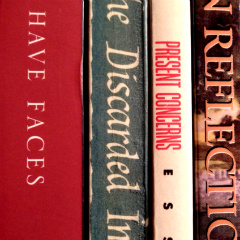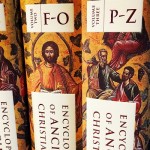C.S. Lewis never imagined the lasting influence he would have. “After I’ve been dead five years,” he told his friend Owen Barfield, “no one will read anything I’ve written.” Proving the old prof wrong, last month we marked the forty-ninth year of his passing, and Lewis is read today perhaps more than ever.
Still, this is a reasonable thought for an author. Books are not immortal. They rarely live beyond the generation of their author and earliest readers, and usually they die much sooner than that.
The blood and breath of books are the thoughts and words of readers, the people who animate the pages once an author has let them go. Almost inevitably readers stop thinking and talking about them. When that happens, they fall out of mind and die. Only a handful of special books bridge the generations and find readers to breathe life between their leaves one decade after another, books like—despite his humble self-assessment—Lewis’.
Most any serious Christian reader is familiar with several of Lewis’ titles: Mere Christianity, The Screwtape Letters, Surprised by Joy. The Chronicles of Narnia delight adult and child alike, while others have wrestled to ground more complicated offerings, like The Abolition of Man.
I present here four Lewis books of lesser popularity. The first and second are essay collections published posthumously. The third is an analysis of mediaeval thought and literature. The fourth is a novel. They may not sit as high on someone’s list as, say, The Four Loves or The Horse and his Boy, but they are nonetheless well worth the read.
1. Christian Reflections. Many essays in this collection involve how a Christian should think and interact with currents in the wider world. One reason it’s so useful and enjoyable is that it presents brief treatments of ideas that Lewis elaborated upon elsewhere. Essays like “On Ethics,” “The Poison of Subjectivism,” “The Psalms,” and “Petitionary Prayer” are like seeds that soon flowered into full books. Here the reader has a chance to view them in miniature.
Passages are characteristically insightful, sometimes humorous. In his discussion on “Christianity and Literature,” for instance, Lewis notes, “Boiling an egg is the same process whether you are a Christian or a Pagan.”
2. Present Concerns. This is a later collection than Christian Reflections, and its essays feel more off the cuff. Most were written for magazines and newspapers. And while that could significantly date more than a few, there are gems here unfaded by the news cycle. There is an article on chivalry, for instance, that casts some illuminating color on present conversations about men and prolonged adolescence.
And then there’s this from the essay, “Equality”:
I am a democrat because I believe in the Fall of Man. . . . I do not deserve a share in governing a hen-roost, much less a nation. Nor do most people — all the people who believe advertisements, and think in catchwords, and spread rumors. . . . The real reason for democracy is . . . [m]ankind is so fallen that no man can be trusted with unchecked power over his fellows.
Would that people took such sentiments more seriously.
3. The Discarded Image. This is perhaps a trickier title than the previous two, but it really rewards a close read. Billed as “An Introduction to to Medieval and Renaissance Literature,” it functions as a very accessible introduction to medieval thought and how it intersects with the modern mind.
Given our slavish adherence to naturalistic materialism, Lewis’ analysis provides fresh insight into how models of seeing the world develop and get dropped. I think it’s particularly useful in explaining how contemporaries tend to believe similarly even when they think they are on different pages. There is an unavoidable intellectual interplay — how much of that is affecting us today without our being aware of it?
4. Till We Have Faces. I believe that this is the least popular of Lewis’ novels, but I’ve been gripped by his retelling of the myth of Cupid and Psyche since first reading it two decades ago. I’ve read it several time since and cannot quite exhaust it.
It’s foolish to reduce such a book to a few lines, but here’s risking it. Ultimately, the book turns on the question of possessive love: Can such a love be what it purports to be, or is it really something merely selfish, something ugly, perhaps even something demonic?
It reminds me in this way of Cormac McCarthy’s most emotionally powerful novel, The Road, in which possessive love ultimately disfigures and alienates. In a culture as entitled and self-actualized as ours, such an insight might prove helpful.
There are of course several other lesser-known Lewis titles that warrant renewed attention. Studies in Words is a joy. And, while I’ve only dipped in and out of A Preface to Paradise Lost, what I’ve read is fascinating. But if you’ve not yet picked up any of these four, I’ve already got your weekend planned.
Check this out: How to get your name in Frank Viola’s new book, When the Pages Are Blank: How to Bring the Bible Back to Life.

















